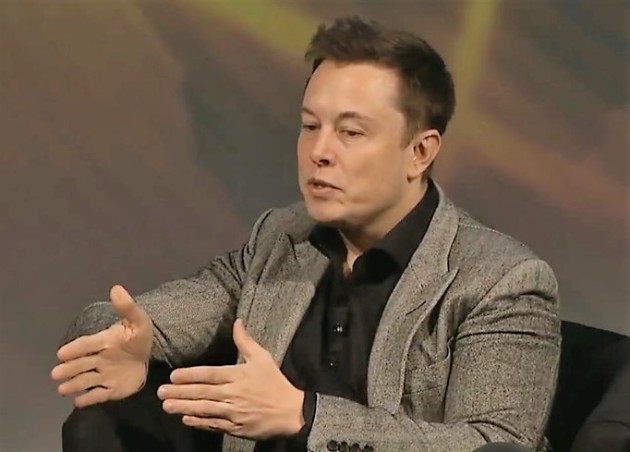
Policymakers have been debating – and dismissing – the idea of putting a tax on carbon emissions for more than a decade, but the way billionaire innovator Elon Musk sees it, the concept is a no-brainer.
The 44-year-old CEO of the SpaceX rocket venture and the Tesla electric car company laid out his rationale today in San Francisco during a webcast chat at the American Geophysical Union’s fall meeting. He said not paying a carbon tax is like not paying for garbage collection.
Say what?
In his chat with AGU President Margaret Leinen, Musk expanded on the argument he made at the Sorbonne during his trip to Paris for the recently concluded climate summit. He starts out by saying that burning fossil fuels comes with a big price tag: carbon dioxide emissions that contribute to climate change. The impacts of climate change are costing real money, and the costs are projected to rise significantly over the next century.
Without a carbon tax, the price of fossil fuel does not reflect the true cost of dealing with the consequences of consumption. “This is analogous to not paying for garbage collection,” Musk said at the Sorbonne. “It’s not as though we should say, in the case of garbage, ‘Have a garbage-free society.’ It’s very difficult to have a garbage-free society. But it’s just important that people pay for the garbage collection.”
Musk says a revenue-neutral carbon tax provides the best way to accelerate the transition to renewable energy sources. The money collected from the tax would be invested in solar, wind, hydrothermal and even nuclear power. That would compensate for the “hidden subsidy” that fossil fuels now enjoy, Musk said.
“When the prices are wrong, then the wrong thing happens in the economy. … Effectively, we’re ‘incenting’ bad behavior,” he said at the AGU meeting. “It’s kinda like if we had high taxes on fruits and vegetables, and low taxes on cigarettes and alcohol. That wouldn’t make sense. That’s sort of what we have right now with respect to energy, and there are very powerful forces trying to keep it that way.”
At one time, Republicans as well as Democrats favored instituting some sort of carbon emission fee, but in the current political climate (heh, heh), there’s little chance that such a proposal will get anywhere. Nevertheless, some advocates keep trying.
It should be noted that Musk is chairman of Solar City, a company that provides solar power. The revenue raised by a carbon tax would presumably give a boost to renewable-energy companies such as Solar City.
Because people keep close track of the stuff Elon says, here are a few more sound bites from Musk’s AGU chat:
- Musk said he’s so focused on seeing humans get settled on Mars because the probability of civilzation’s survival is “much greater if we are a multiplanet species. … Now is the first time in the history of Earth that the window is opened, where it’s possible to extend life to another planet.” But it’s not clear how long that window will stay open. For example, the planet could be ruined by a global catastrophe or World War III. “I think the wise move is to make life multiplanetary while we can,” Musk said. (In January, he said he hoped to unveil his strategy for Mars colonization this year. But in a recent GQ interview, he said the unveiling may be put off until early next year.)
- It will be “super-hard” to establish a human colony on Mars, Musk said. “I suspect I probably won’t live to see it become self-sustaining, but if we are to aim for that objective, then there are important technological steps that are needed to get there.” Having reusable rockets would be a big step, which is why Musk is so set on being able to land and reuse SpaceX’s Falcon 9 boosters.
- He admitted that seeing the breakup of a Falcon 9 rocket in June was “actually quite traumatic,” but said the Falcon 9 has been “significantly improved” over the past few months, thanks in part to upgrades in the rocket’s cryogenic propellant tanks. The first Falcon 9 launch since June’s failure could come as early as this weekend.
- Musk said “there’s nothing wrong with nuclear power, whether fission or fusion,” as long as it’s done right. But he thinks a combination of photovoltaic solar power, hydroelectric power and improved battery storage systems will provide an easier route to a sustainable energy economy.
- One questioner asked Musk what students should be learning about to be prepared for the nation’s future workforce. “Software engineering is probably the single biggest area that people should learn,” he replied. “I’ve always been a fan of physics, general economics and critical thinking. We really should be teaching critical thinking a lot more.”
This story was updated with additional bullet points from Musk’s talk.



